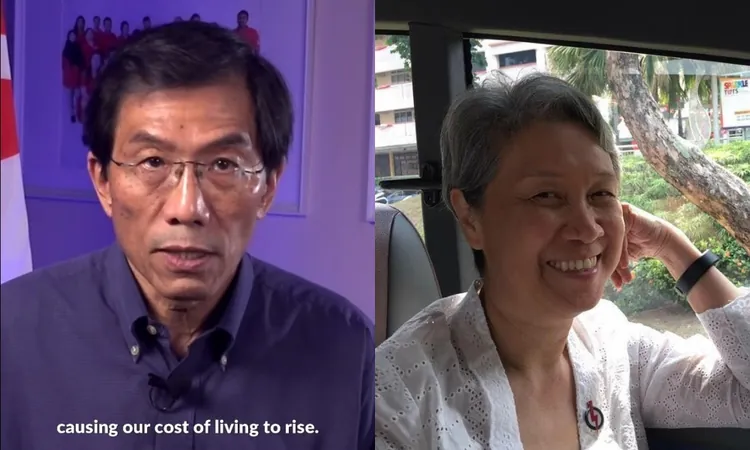
Dr. Chee Soon Juan Challenges Ho Ching's Population Vision for Singapore
2024-10-03
Author: Wei Ling
Dr. Chee Soon Juan's Rebuttal
In a strong rebuttal, Dr. Chee Soon Juan, Secretary-General of the Singapore Democratic Party (SDP), criticized Ho Ching, the spouse of Senior Minister Lee Hsien Loong, for her controversial assertion that Singapore could sustain a population of 8 to 10 million people through effective city planning and land reclamation. Dr. Chee addressed this topic in a video message on October 1, where he expressed deep skepticism about increasing the population, especially one that surpassed the current 6 million mark, which has largely been propelled by a surge in foreign nationals.
Dr. Chee emphasized that the influx of foreigners has not been without its disruptions. He pointed to adverse effects such as rising living costs and increased competition for jobs. Drawing on international examples, he cited several Nordic countries thriving despite their relatively small populations and even producing Nobel laureates, underscoring that a larger population isn't necessarily a boon.
Concerns Over Population Expansion
Dr. Chee was quick to counter her sentiments, recalling his own reprimand by Minister for Foreign Affairs Dr. Vivian Balakrishnan for sounding alarms about rapid population growth during the last General Election. He raised a critical question on why Ho Ching had not faced the same level of scrutiny.
In his video, Dr. Chee delineated the potential perils of an increased population, including soaring demands for housing, food, and transportation, which could further inflate living costs. He contended that accommodating such growth would require substantial investment in housing and infrastructure, likely resulting in higher taxes and a strained public transport system plagued by recurrent breakdowns. Dr. Chee also expressed concern for the mental health of Singaporeans, exacerbated by overpopulation and congestion.
Economic Alternatives and the Importance of Quality
Dr. Chee argued against the ruling government's fixation on population growth as an economic strategy, suggesting it reflects a lack of innovative solutions. He criticized the Peoples’ Action Party (PAP) for relying on traditional construction and urban expansion methods to sustain GDP growth, thereby creating an illusion of economic vitality while disregarding the potential downsides.
He maintained that a smaller population could facilitate a focus on quality over quantity, stating, “The talent, energy, and potential of a population are far more critical than its sheer size.” He pointed to political freedoms in other countries as catalysts for innovation, contrasting this with what he characterizes as the stifling of creativity and expression within Singapore's political environment.
Dr. Chee encouraged Singaporeans to engage critically with government narratives and to demand a more mature and inclusive approach to governance.
Ongoing Economic Challenges and Public Sentiment
In light of Dr. Chee's challenges to population policies, Prime Minister Lawrence Wong's recent addresses regarding the cost of living have also stirred public debate. A video released on October 2 acknowledged persistent concerns over living costs, with Wong asserting that the government is committed to aiding citizens. However, many netizens expressed dissatisfaction, calling for more direct actions addressing transport and rental costs, rather than interim measures like Community Development Council vouchers.
The discourse around Singapore’s demographic policies continues to evolve, with former banker Chris Kuan questioning the nation’s growing reliance on foreign labor. His analysis highlights that while Singapore's total population has surpassed 6 million, a significant portion consists of non-residents, underscoring a crucial dependency on foreign workers that often goes unnoticed in official economic statistics.
As discussions progress, it is clear that the topics of population growth, economic strategy, and social equity are at the forefront of public discourse in Singapore, requiring earnest engagement from both citizens and their leaders if they are to navigate these complex challenges.


 Brasil (PT)
Brasil (PT)
 Canada (EN)
Canada (EN)
 Chile (ES)
Chile (ES)
 España (ES)
España (ES)
 France (FR)
France (FR)
 Hong Kong (EN)
Hong Kong (EN)
 Italia (IT)
Italia (IT)
 日本 (JA)
日本 (JA)
 Magyarország (HU)
Magyarország (HU)
 Norge (NO)
Norge (NO)
 Polska (PL)
Polska (PL)
 Schweiz (DE)
Schweiz (DE)
 Singapore (EN)
Singapore (EN)
 Sverige (SV)
Sverige (SV)
 Suomi (FI)
Suomi (FI)
 Türkiye (TR)
Türkiye (TR)